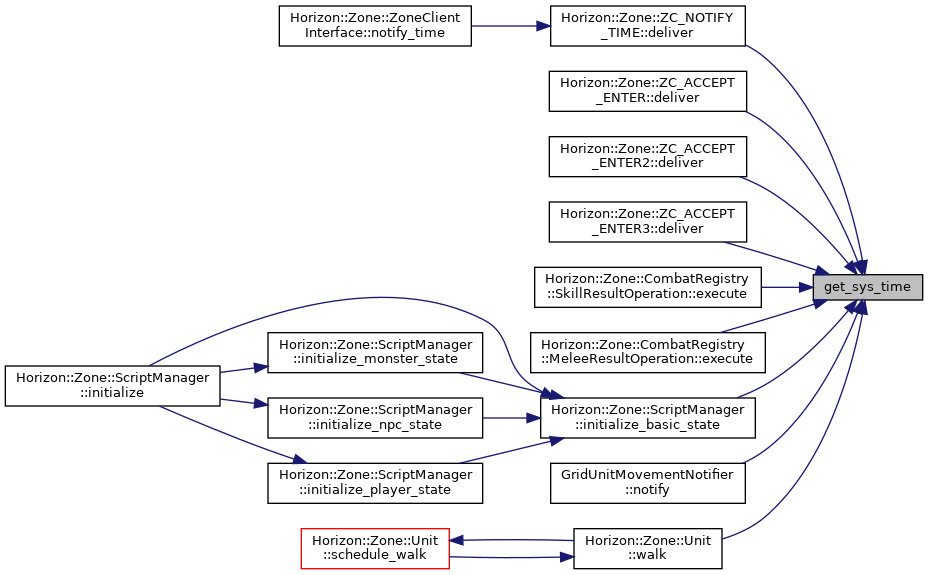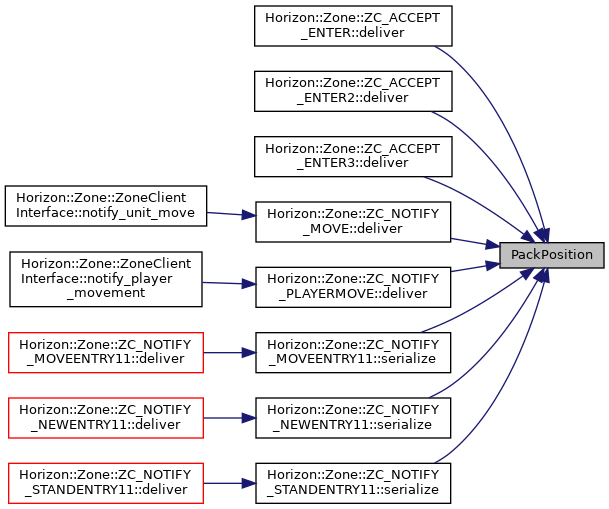#include <cstdint>#include <ctime>#include <chrono>#include <cstring> Include dependency graph for Utility.hpp:
Include dependency graph for Utility.hpp: This graph shows which files directly or indirectly include this file:
This graph shows which files directly or indirectly include this file:Go to the source code of this file.
Functions | |
| uint32_t | getMSTime () |
| uint32_t | getMSTimeDiff (uint32_t oldMSTime, uint32_t newMSTime) |
| uint32_t | GetMSTimeDiffToNow (uint32_t oldMSTime) |
| int64_t | get_sys_time () |
| uint32_t | rgb2bgr (uint32_t rgb) |
| const char * | TimeStamp2String (char *str, size_t size, time_t timestamp, const char *format) |
| uint16_t | ntows (uint16_t netshort) |
| void | PackPosition (int8_t *p, uint16_t x0, uint16_t y0, uint16_t x1, uint16_t y1, uint8_t sx0, uint8_t sy0) |
| void | PackPosition (int8_t *p, uint16_t x, uint16_t y, uint8_t dir) |
| void | UnpackPosition (const uint8_t *p, uint16_t *x, uint16_t *y, uint8_t *dir) |
| unsigned int | GetULong (unsigned char *p) |
| float | GetFloat (const unsigned char *buf) |
| int16_t | MakeShortLE (int16_t val) |
| int32_t | MakeLongLE (int32_t val) |
| uint16_t | GetUShort (const unsigned char *buf) |
| uint32_t | GetULong (const unsigned char *buf) |
| uint64_t | GetULongLong (const unsigned char *buf) |
| int32_t | GetLong (const unsigned char *buf) |
| int64_t | GetLongLong (const unsigned char *buf) |
| uint32_t | Concatenate (uint32_t a, uint32_t b) |
Function Documentation
◆ Concatenate()
| uint32_t Concatenate | ( | uint32_t | a, |
| uint32_t | b | ||
| ) |
◆ get_sys_time()
| int64_t get_sys_time | ( | ) |
Referenced by Horizon::Zone::ZC_NOTIFY_TIME::deliver(), Horizon::Zone::ZC_ACCEPT_ENTER::deliver(), Horizon::Zone::ZC_ACCEPT_ENTER2::deliver(), Horizon::Zone::ZC_ACCEPT_ENTER3::deliver(), Horizon::Zone::CombatRegistry::SkillResultOperation::execute(), Horizon::Zone::CombatRegistry::MeleeResultOperation::execute(), Horizon::Zone::ScriptManager::initialize_basic_state(), GridUnitMovementNotifier::notify(), and Horizon::Zone::Unit::walk().
 Here is the caller graph for this function:
Here is the caller graph for this function:◆ GetFloat()
| float GetFloat | ( | const unsigned char * | buf | ) |
References GetULong().
Referenced by Horizon::Libraries::MapCache::GetMapFromGRF().
 Here is the call graph for this function:
Here is the call graph for this function: Here is the caller graph for this function:
Here is the caller graph for this function:◆ GetLong()
| int32_t GetLong | ( | const unsigned char * | buf | ) |
References GetULong().
Referenced by GRF::load().
 Here is the call graph for this function:
Here is the call graph for this function: Here is the caller graph for this function:
Here is the caller graph for this function:◆ GetLongLong()
| int64_t GetLongLong | ( | const unsigned char * | buf | ) |
References GetULongLong().
Referenced by GRF::load().
 Here is the call graph for this function:
Here is the call graph for this function: Here is the caller graph for this function:
Here is the caller graph for this function:◆ getMSTime()
| uint32_t getMSTime | ( | ) |
References GridTypeListIterator::count().
Referenced by GetMSTimeDiffToNow().
 Here is the call graph for this function:
Here is the call graph for this function: Here is the caller graph for this function:
Here is the caller graph for this function:◆ getMSTimeDiff()
| uint32_t getMSTimeDiff | ( | uint32_t | oldMSTime, |
| uint32_t | newMSTime | ||
| ) |
Referenced by GetMSTimeDiffToNow().
 Here is the caller graph for this function:
Here is the caller graph for this function:◆ GetMSTimeDiffToNow()
| uint32_t GetMSTimeDiffToNow | ( | uint32_t | oldMSTime | ) |
References getMSTime(), and getMSTimeDiff().
 Here is the call graph for this function:
Here is the call graph for this function:◆ GetULong() [1/2]
| uint32_t GetULong | ( | const unsigned char * | buf | ) |
◆ GetULong() [2/2]
| unsigned int GetULong | ( | unsigned char * | p | ) |
Referenced by GetFloat(), GetLong(), Horizon::Libraries::MapCache::GetMapFromGRF(), and GRF::load().
 Here is the caller graph for this function:
Here is the caller graph for this function:◆ GetULongLong()
| uint64_t GetULongLong | ( | const unsigned char * | buf | ) |
Referenced by GetLongLong().
 Here is the caller graph for this function:
Here is the caller graph for this function:◆ GetUShort()
| uint16_t GetUShort | ( | const unsigned char * | buf | ) |
◆ MakeLongLE()
| int32_t MakeLongLE | ( | int32_t | val | ) |
◆ MakeShortLE()
| int16_t MakeShortLE | ( | int16_t | val | ) |
◆ ntows()
| uint16_t ntows | ( | uint16_t | netshort | ) |
◆ PackPosition() [1/2]
| void PackPosition | ( | int8_t * | p, |
| uint16_t | x, | ||
| uint16_t | y, | ||
| uint8_t | dir | ||
| ) |
Referenced by Horizon::Zone::ZC_ACCEPT_ENTER::deliver(), Horizon::Zone::ZC_ACCEPT_ENTER2::deliver(), Horizon::Zone::ZC_ACCEPT_ENTER3::deliver(), Horizon::Zone::ZC_NOTIFY_MOVE::deliver(), Horizon::Zone::ZC_NOTIFY_PLAYERMOVE::deliver(), Horizon::Zone::ZC_NOTIFY_MOVEENTRY11::serialize(), Horizon::Zone::ZC_NOTIFY_NEWENTRY11::serialize(), and Horizon::Zone::ZC_NOTIFY_STANDENTRY11::serialize().
 Here is the caller graph for this function:
Here is the caller graph for this function:◆ PackPosition() [2/2]
| void PackPosition | ( | int8_t * | p, |
| uint16_t | x0, | ||
| uint16_t | y0, | ||
| uint16_t | x1, | ||
| uint16_t | y1, | ||
| uint8_t | sx0, | ||
| uint8_t | sy0 | ||
| ) |
◆ rgb2bgr()
| uint32_t rgb2bgr | ( | uint32_t | rgb | ) |
◆ TimeStamp2String()
| const char * TimeStamp2String | ( | char * | str, |
| size_t | size, | ||
| time_t | timestamp, | ||
| const char * | format | ||
| ) |
◆ UnpackPosition()
| void UnpackPosition | ( | const uint8_t * | p, |
| uint16_t * | x, | ||
| uint16_t * | y, | ||
| uint8_t * | dir | ||
| ) |
Referenced by Horizon::Zone::CZ_REQUEST_MOVE::deserialize(), Horizon::Zone::CZ_REQUEST_MOVE2::deserialize(), and Horizon::Zone::CZ_REQUEST_MOVENPC::deserialize().
 Here is the caller graph for this function:
Here is the caller graph for this function:















